The David Cameron story
- Published

Whatever else he achieved during his six years in power, David Cameron, who quit as prime minister in July and has now announced he is to step down as an MP, will forever be remembered as the man who took Britain out of the European Union.
It is a strange epitaph for a political leader who once vowed to stop his party "banging on about Europe" and it is hardly the way he would have wanted to go down in history.
He led the Conservative Party for nearly 11 years - only Stanley Baldwin, Lady Thatcher and Sir Winston Churchill spent longer in the job in modern times - returning them to power after more than a decade in the political wilderness.
When he burst on to the scene in 2005, beating better-known rivals to the party leadership, he wanted to be seen as a new kind of Conservative, young, liberal-minded, socially concerned and, above all, modern.
There would be no place in Cameron's Conservative Party for the toxic rows about the European Union that had brought the party to the brink of destruction under previous leaders.
Instead, there would be a positive, upbeat, inclusive vision of Britain. He spoke of making the Conservatives the party of the NHS and the environment and of "sharing the proceeds of growth" with the less well-off.
One of his proudest early achievements was to get a round of applause from a Conservative conference audience for civil partnerships.
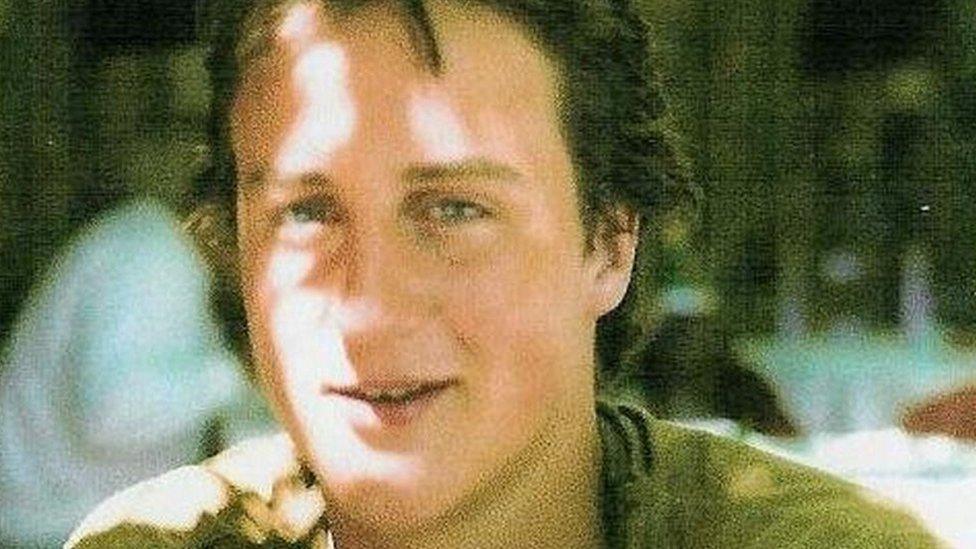
Mr Cameron attended Eton and Oxford University
When the 2008 banking crisis hit, his tone changed - the social reforms were still there but they were accompanied by a more traditional Conservative focus on balancing the books through public spending cuts. He always refused to see a contradiction between the two goals, arguing that the country could do "more with less".
A self-styled pragmatist, who claimed to be suspicious of ideology, Mr Cameron was always able to trim his positions to suit the times.
It was this flexibility that enabled him to form alliances with political opponents, most notably with Liberal Democrat leader Nick Clegg, in the first coalition government since the war, and later when he shared platforms with Labour figures during the referendum campaign.
But it was a quality that bred suspicion and, in the end, outright hostility among his more ideologically pure Conservative colleagues, who wondered what, if anything, he stood for.
His privileged background also became a source of resentment for some in his party, who preferred their leaders in the grammar-school educated, self-made mould of a Thatcher or Major.
Mr Cameron was the first Conservative leader since the early 1960s to have attended one of Britain's top fee-paying schools, Eton, and he can trace his ancestry back to William IV, making him a distant relative of the Queen.
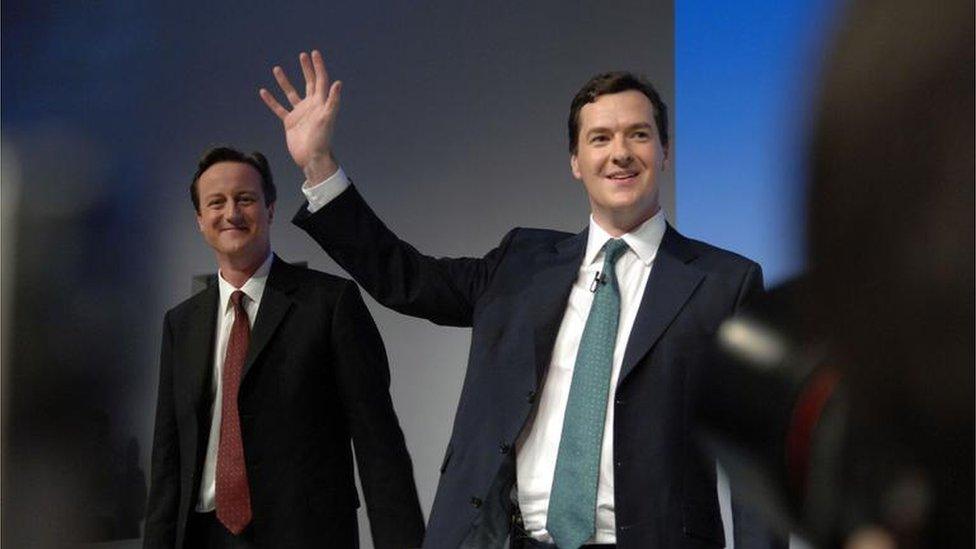
His close alliance with George Osborne was key to his career
He never made a secret of his privileged background, saying he wanted everyone in Britain to have the kind of advantages in life that he had had.
It only became an issue earlier this year when his late father Ian was named as a one-time client of Mossack Fonseca, a Panama-based firm at the centre of a tax avoidance scandal.
Mr Cameron was eventually forced to publish his tax returns, a first for a British prime minister, which showed he had received a £200,000 gift from his mother, which could potentially avoid inheritance tax.
Seeing his beloved father traduced in the media was painful for Mr Cameron, who had always spoken with admiration of his fighting spirit.
Ian Cameron, who died in 2010, was born with severely deformed legs, which he eventually had to have amputated. He also lost the sight in one eye, but David's father said he never considered himself "disabled" and rarely complained about anything.
David Cameron has said he had a happy childhood, but one where "whingeing was not on the menu".

Cameron in his own words
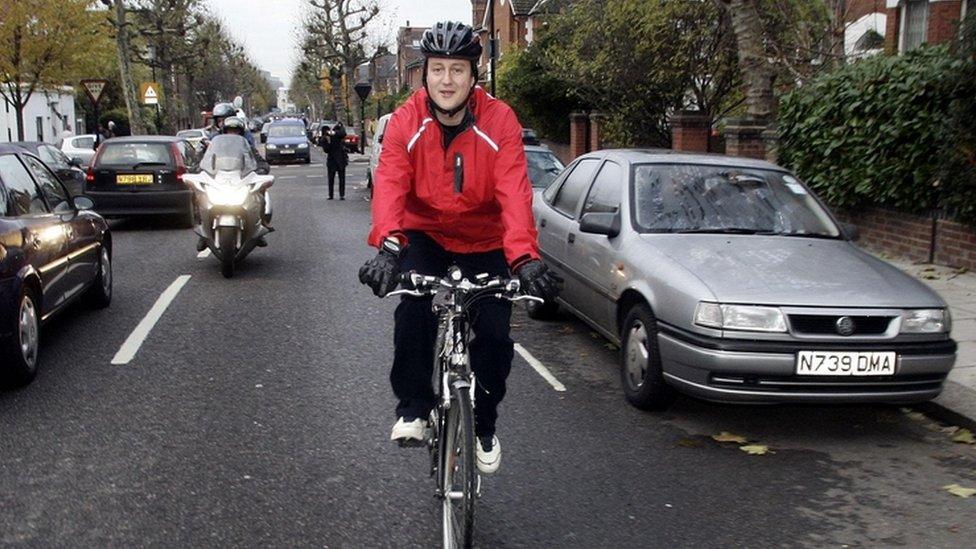
"I'm a practical person, and pragmatic. I know where I want to get to, but I am not ideologically attached to one particular method," December 2005.
"I'm going to be as radical a social reformer as Mrs Thatcher was an economic reformer," August 2008.
"I don't support gay marriage in spite of being a Conservative. I support gay marriage because I am a Conservative," July 2013.
"I hope they'd say I'm optimistic, I enjoy life and that I'm fun. But also that I'm quite driven in doing what I believe in," on what his friends would say about him, February 2015.
"We will govern as a party of one nation, one United Kingdom. That means ensuring this recovery reaches all parts of our country, from north to south, to east to west," May 2015.

The third of four children, he was born on 9 October 1966 in London and spent the first three years of his life in Kensington and Chelsea before the family moved to an old rectory near Newbury, in Berkshire.
Mr Cameron's mother, Mary, served as a Justice of the Peace for 30 years. During her time on the bench she passed judgement on the Greenham Common protesters, including on one occasion her own sister and eco-warrior Swampy, who was protesting against the construction of the Newbury bypass.
At the age of seven, the young Cameron was packed off to Heatherdown, an exclusive preparatory school, which counted Princes Edward and Andrew among its pupils. Then, following in the family tradition, came Eton.
He has described his 12 O-levels as "not very good", but he gained three As at A-level, in history, history of art and economics with politics.
His biggest mention in the Eton school magazine came when he sprained his ankle dancing to bagpipes on a school trip to Rome.
Before going to Oxford to study Philosophy, Politics and Economics he took a gap year, working initially for Sussex Conservative MP Tim Rathbone, before spending three months in Hong Kong, working for a shipping agent, and then returning by rail via the Soviet Union and Eastern Europe.
At Oxford, he avoided student politics because, according to one friend from the time, Steve Rathbone, "he wanted to have a good time".
He was captain of Brasenose College's tennis team and a member of the Bullingdon dining club, famed for its hard drinking and bad behaviour, a period Mr Cameron has always refused to talk about.
He has also consistently dodged the question of whether he took drugs at university.

What others say
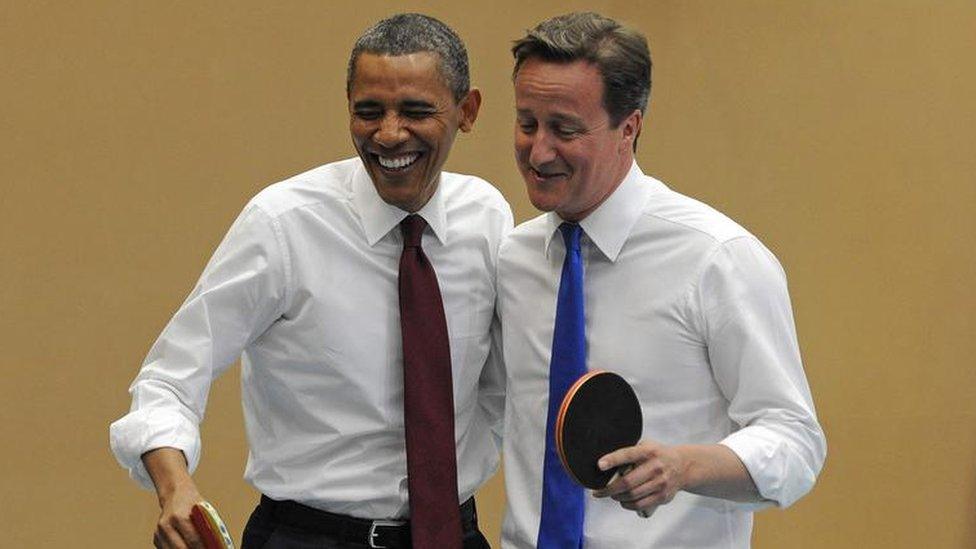
"He's not someone - and most Englishmen aren't - who talks freely and easily in the open-hearted Oprah-esque fashion that some do but he's extremely good company," friend and ministerial colleague Michael Gove in 2010
"He's always been incredibly strong, and kind, and supportive," Samantha Cameron, wife
"In good times and in bad, he's just the kind of partner that you want at your side. I trust him. He says what he does, and he does what he says," US President Barack Obama.
"If there was an Olympic gold medal for chillaxing he would win it," Cameron ally quoted in Francis Elliott and James Hanning biography.
"Though possessed of a first-class mind, Cameron is not a reflective politician. He rarely agonises over a problem, preferring to resolve dilemmas as quickly and pragmatically as he can, generally with a group of close allies," political journalist Matthew D'Ancona.

But he evidently did not let his extra-curricular activities get in the way of his studies.
His tutor at Oxford, Prof Vernon Bogdanor, describes him as "one of the ablest" students he has taught, whose political views were "moderate and sensible Conservative".
After gaining a first-class degree, he briefly considered a career in journalism or banking, before answering an advertisement for a job in the Conservative Research Department.
Conservative Central Office is reported to have received a telephone call on the morning of his interview in June 1988, from an unnamed man at Buckingham Palace, who said: "I understand you are to see David Cameron.
"I've tried everything I can to dissuade him from wasting his time on politics but I have failed. I am ringing to tell you that you are about to meet a truly remarkable young man."

Cameron off-duty
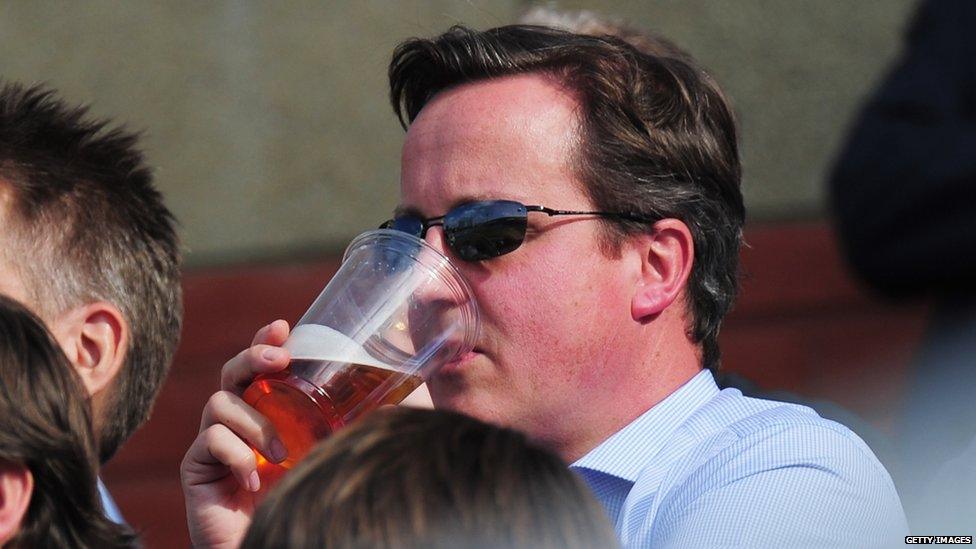
Music: Bob Dylan and indie rock such as The Killers, The Smiths, Radiohead and Pulp.
Books: Goodbye to All That by Robert Graves, Cider With Rosie, by Laurie Lee
Films: Lawrence of Arabia, The Godfather
TV: Game of Thrones, Breaking Bad, The Killing
Leisure time: Karaoke, playing computer games
Sport: Playing tennis, snooker, running, watching cricket. Supports Aston Villa football club, although he got mixed up during the general election campaign and said West Ham

Mr Cameron says he did not know the call was being made or who made it, but it is sometimes held up by his opponents as an example of his gilded passage to the top.
As a researcher, Mr Cameron was seen as hard-working and bright. He worked with future shadow home secretary David Davis on the team briefing John Major for Prime Minister's Questions, and also hooked up with George Osborne, who would go on to be his chancellor and closest political ally.
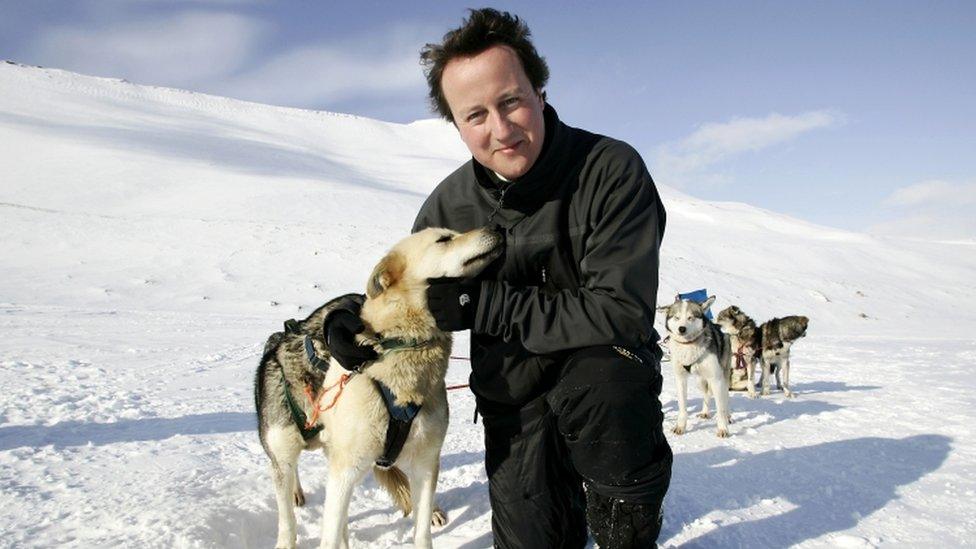
Mr Cameron grabbed headlines in 2005 with a trip to the Arctic Circle
Other colleagues, in what became known as the "brat pack" were Steve Hilton, who was one of Mr Cameron's closest strategy advisers during his early days in Downing Street, and future Health Secretary Andrew Lansley.
These young researchers were credited with devising the attack on Labour's tax plans that unexpectedly swung the 1992 general election for John Major.
But the remainder of Mr Cameron's time as a backroom boy in the Conservative government was more turbulent.
He was poached by then Chancellor Norman Lamont as a political adviser, and was at Mr Lamont's side throughout Black Wednesday, which saw the pound crash out of the European Exchange Rate Mechanism.
By the early 1990s, Mr Cameron had decided he wanted to be an MP himself, but he also knew it was vital to gain experience outside of politics.
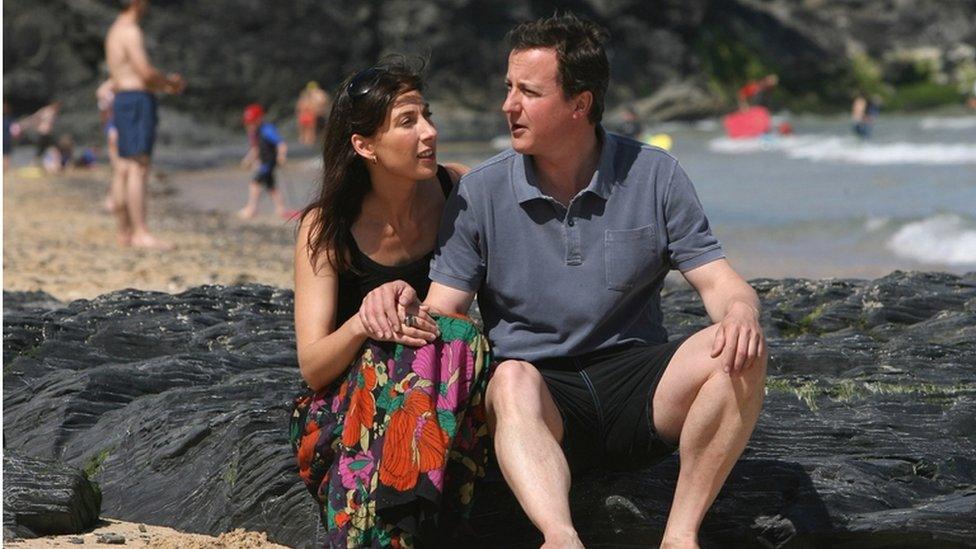
So after a brief spell as an adviser to then home secretary Michael Howard, he took a job in public relations with ITV television company Carlton.
Mr Cameron spent seven years at Carlton, as head of corporate communications, travelling the world with the firm's boss Michael Green, who described him as "board material".
He went part-time from his job at Carlton in 1997 to unsuccessfully contest Stafford at that year's general election. Four years later, in 2001, he won the safe Conservative seat of Witney, in Oxfordshire, recently vacated by Shaun Woodward, who had defected to Labour.
Samantha Cameron, the daughter of Sir Reginald Sheffield, 8th Baronet, worked as the creative director of upmarket stationery firm Smythson of Bond Street, which counts Stella McCartney, Kate Moss and Naomi Campbell among its clients. She has been credited with transforming her husband's staid "Tory boy" image.
She has a tattoo on her ankle and went to art school in Bristol, where she says she was taught to play pool by rap star Tricky.
The couple were introduced by Mr Cameron's sister Clare, Samantha's best friend, at a party at the Cameron family home. They were married in 1996.
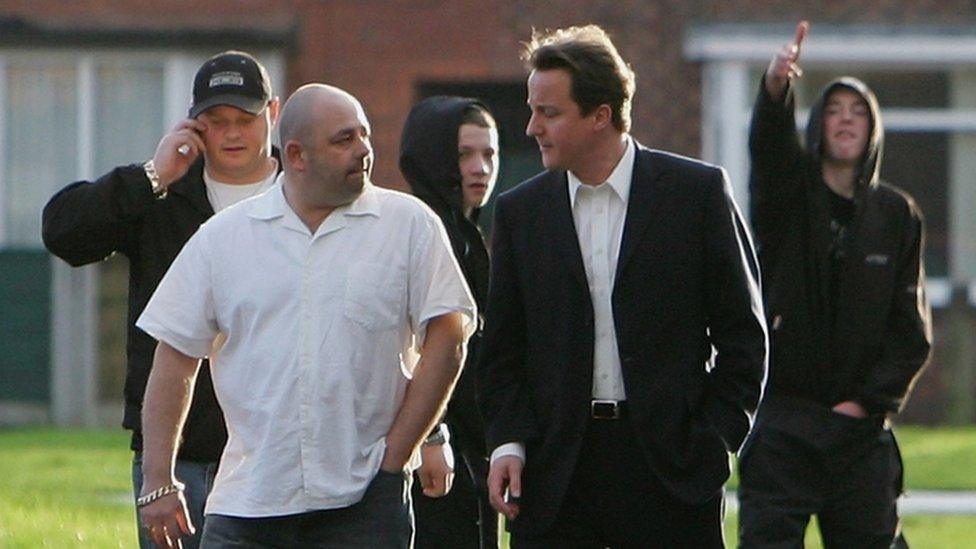
Mr Cameron was mocked for his 'hug a hoodie' speech
They have three children, Nancy, Arthur, and Florence, who was born shortly after the family moved into Downing Street.
Their first child, Ivan, who was born profoundly disabled and needed round-the-clock care, died in February 2009.
The experience of caring for Ivan and witnessing at first hand the dedication of NHS hospital staff, is said by friends to have broadened Mr Cameron's horizons. He had, friends say, led an almost charmed life, to that point.
On entering Parliament in 2001, Mr Cameron rose rapidly through the ranks, serving first on the Home Affairs Select Committee, which recommended the liberalisation of drug laws.
He was taken under the wing of Michael Howard, who put him in charge of policy co-ordination and then made him shadow education secretary. He also had the key role of drafting the 2005 Conservative election manifesto.
But when he entered the race to succeed Mr Howard as party leader in 2005 few initially gave him a chance. He was a distant fourth at the bookmakers behind Ken Clarke, Liam Fox and frontrunner David Davis.
It took an eye-catching conference speech, delivered without notes, in what would become his trademark style, to change the minds of the party faithful.
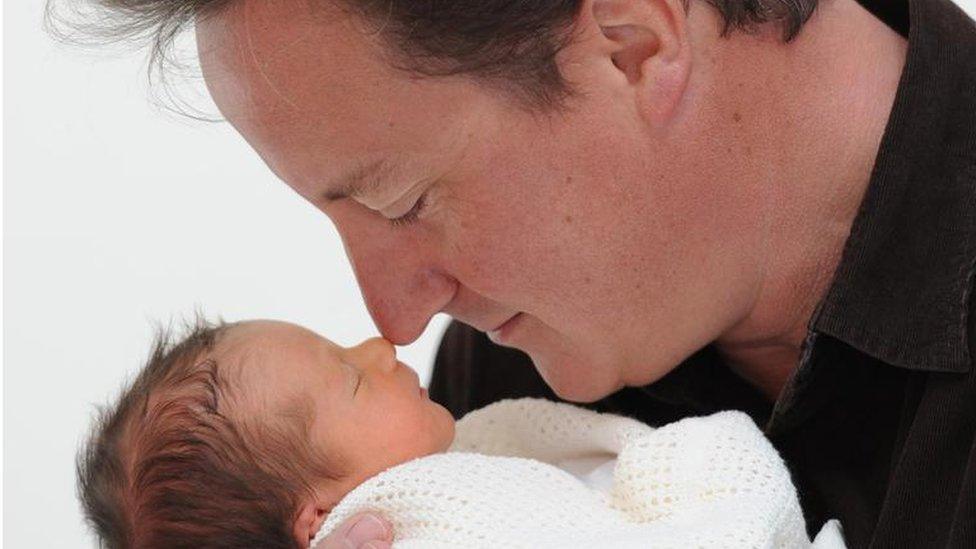
David Cameron and daughter Florence in 2010
A few may have had second thoughts, when in the early months of his leadership he spoke about how some young offenders just needed love (caricatured by his opponents as his "hug a hoodie" speech) and was pictured with huskies in the Arctic Circle on a trip to investigate climate change.
The media, eager for a new story after years of Tory failure and with an increasingly unpopular Labour government, gave him the glowing coverage he craved, helping him to "decontaminate" the Tory brand and move the party back towards the centre ground, where, the conventional wisdom has it, British elections are won and lost.
He was rewarded with big poll leads - but the financial crisis forced Mr Cameron to ditch much of his upbeat rhetoric, in favour of a more sober, even gloomy, approach, warning voters they faced tough times and spending cuts ahead.
During the course of the 2010 general election campaign, he watched much of his poll lead evaporate, with the rise of Lib Dem leader Nick Clegg, a man with a similar background and smooth, telegenic manner.
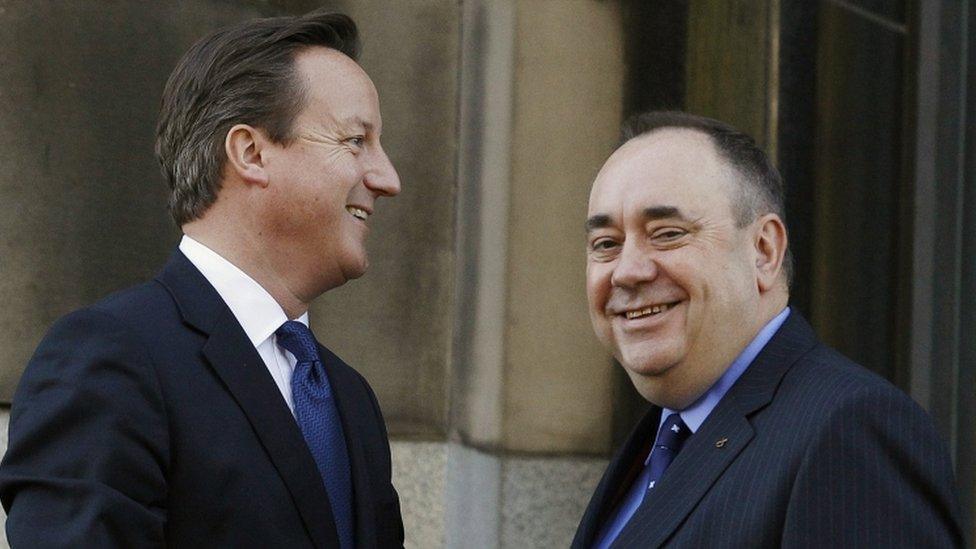
Mr Cameron agreed to a Scottish independence referendum in 2012
What's more, his big idea in 2010, the Big Society, the fruit of detailed policy work stretching back to the early days of his leadership, which envisaged parents setting up their own schools and groups of public sector workers forming co-operatives, failed to capture voters' imagination in the way he had hoped.
Mr Clegg was the surprise victor in the first televised prime ministerial debate ever held in Britain - an innovation Mr Cameron had pushed hard for - and although the Lib Dem leader's advantage had largely disappeared by polling day, the election ended without a clear winner.
Despite gaining 97 seats, the Conservatives' biggest increase in decades, Mr Cameron fell just short of the majority he needed to form a government and was forced into coalition talks with Mr Clegg's Liberal Democrats.
At 43, Mr Cameron was the youngest prime minister since Robert Banks Jenkinson, the 2nd Earl of Liverpool in 1812. He was six months younger than Tony Blair when he entered Downing Street in 1997.
His Chancellor George Osborne, was even younger - the two had formed a close bond from their early days as MPs and would govern very much as a team, like Tony Blair and Gordon Brown had done during the Labour years, but without the bitter rivalry and personal rancour.
EU referendum: Boris v Dave - a rivalry with history
Cameron and Osborne became so closely associated with each other, with the chancellor being groomed to succeed Mr Cameron when the time came, that they came to be known by the critics who were excluded from their tight inner circle by one word: Camborne.
The coalition they formed with Mr Clegg functioned better than anyone expected, managing to complete a full five-year term and introduce sweeping changes to the education system, the NHS, the benefits system, pensions and much else besides.
Mr Clegg and his party took a big hit in the opinion polls, and would eventually lose most of their MPs, over unpopular coalition policies such as the massive cuts to public spending aimed at paying off the deficit and increasing university tuition fees.
Mr Cameron, on the other hand, earned praise for his statesmanlike handling of set-piece events, such as his Commons statement on the Bloody Sunday inquiry, and his ability to look and sound "prime ministerial" when the occasion demanded it.
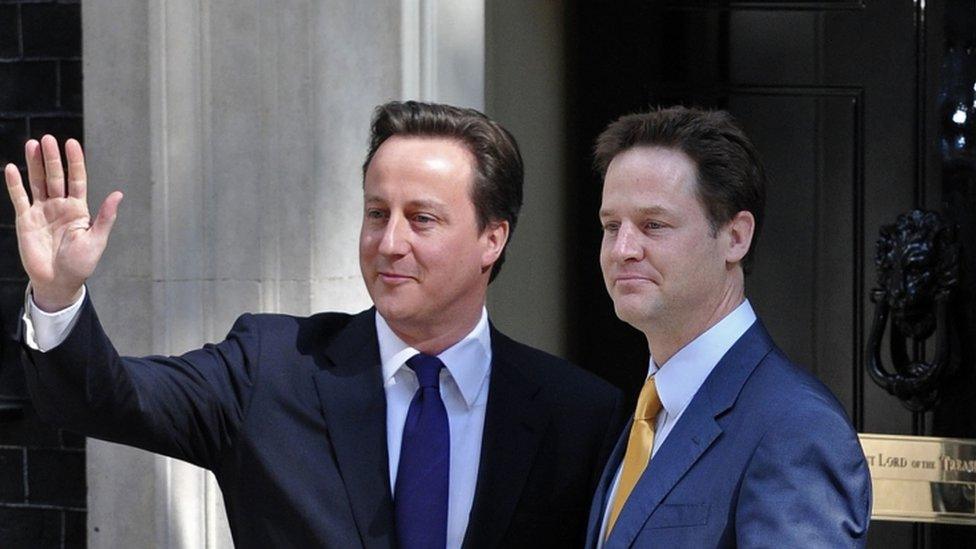
Mr Cameron and Nick Clegg formed a coalition government in 2010
To the surprise of many, possibly including himself, the greatest difficulties he encountered were not in managing the coalition with the Lib Dems but with keeping control of the increasingly vocal and rebellious right-wing of his own party, who hated their party's alliance with Mr Clegg and were beginning to agitate for a referendum on remaining in the EU.
In August 2013, he suffered a major blow to his authority when he became the first prime minister in more than 100 years to lose a foreign policy vote, after dozens of Conservative MPs joined forces with Labour to block his plans for military intervention in Syria.
But perhaps the biggest crisis of his premiership came in the run-up to the Scottish independence referendum in September 2014, when he cancelled Prime Minister's Questions to rush north of the border in an effort to save the Union, after a poll suggested the Yes campaign would win.
He was later forced to issue an apology to the Queen, after he was overheard telling New York mayor Michael Bloomberg Her Majesty had "purred down the line" when he informed her that Scotland had rejected independence.
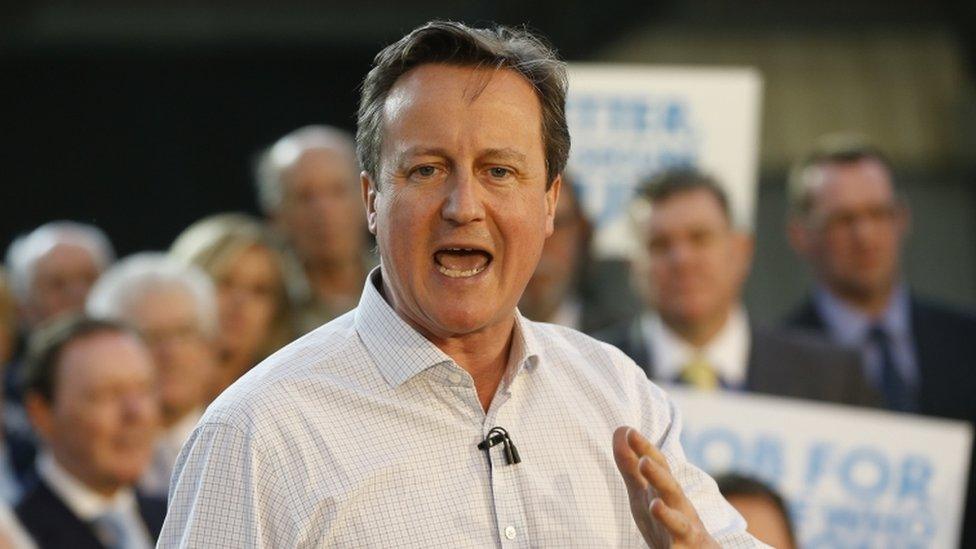
Mr Cameron gets fired up on the campaign trail in the 2015 general election
For some, his handling of the referendum issue, by offering last-minute concessions to the nationalists, added to the idea of Mr Cameron as an "essay crisis" prime minister, who only gets fully engaged with an issue when all seems lost.
Mr Cameron had agreed to a referendum thinking it would settle the issue of Scottish independence once and for all - similar logic that led him to promise a referendum on Britain's continued membership of the EU, in January 2013.
Both decisions, in their different ways, would prove to be spectacular misjudgements.
When he made the EU referendum promise, the Conservatives were losing support to the UK Independence Party, a Eurosceptic outfit he had once airily dismissed as a collection of "fruitcakes, loonies and closet racists".
Europe was not the issue it might have been at the 2015 general election had he not promised a referendum, and, in the end, UKIP only managed to win one seat.
But it was Mr Cameron's warnings to voters not to put the economy at risk by voting Labour that appears to have had the biggest impact, despite critics carping that he was running a negative, fear-based campaign.
The polls suggested another hung Parliament, but Mr Cameron proved the polls wrong and won a slender majority of his own - forming the first Conservative-only government since Sir John Major's in 1992.
He moved quickly to exploit the disarray in the Labour Party, following the election of unknown and untested left winger Jeremy Corbyn as leader, to position the Conservatives as a moderate, "one nation" force and the "party of working people", with a view to securing it in government for a generation.
This was starkly at odds, said critics, with his government's renewed commitment to austerity, but Mr Cameron was also keen to secure a legacy of social reform, with plans to improve the "life chances" of ethnic minorities and the socially disadvantaged.
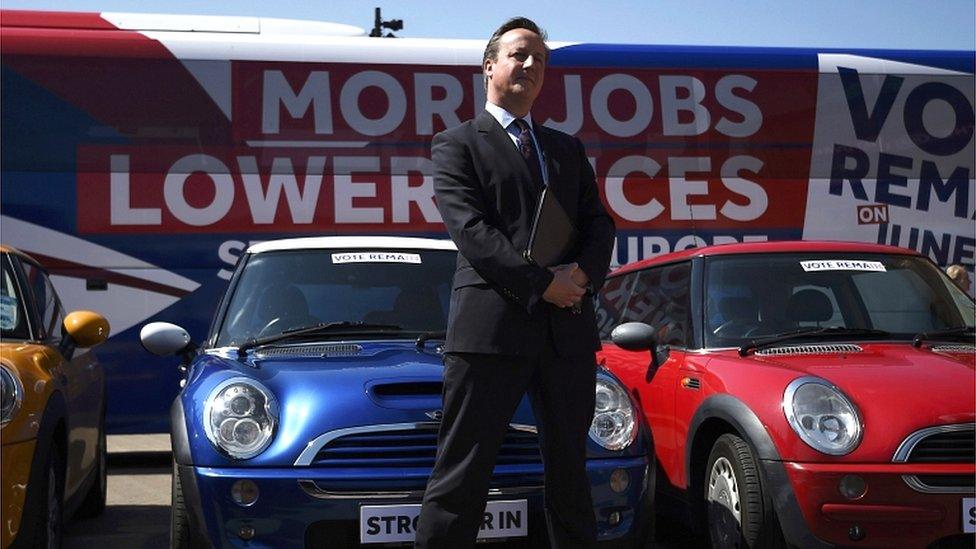
Mr Cameron led the campaign to keep Britain in the EU
His honeymoon period was short-lived, however, as his government suffered a string of defeats at the hands of his own backbenchers, most notably over Chancellor George Osborne's plans to cut disability benefits.
And his decision to go for an early referendum saw him pitched into a round of shuttle diplomacy with fellow European leaders, as he attempted to put together a new deal aimed at keeping Britain in the EU.
He placed himself front and centre of the negotiations and the referendum campaign that followed - his use of the personal pronoun was striking, it was always "my referendum". The deal he returned was, predictably, dismissed by critics as falling far short of what he had promised, particularly on the issue of the free movement of people.
But Mr Cameron insisted the curbs on welfare payments he had wrung out of the other EU leaders would help control immigration - and the man who had insisted he would "rule nothing out" if he did not get what he wanted from Brussels was now transformed into a passionate advocate for Britain's continued membership of the EU.
It was a shift in position too far for many in his party, the majority of whom wanted Britain out of the EU.
And despite returning them to power months earlier, they were in no mood to be told what to do by Mr Cameron. He was forced to suspend collective cabinet responsibility, allowing ministers to campaign for either side in the referendum, even though the government's official position was for Britain to remain in the EU.
Former London Mayor Boris Johnson, a former schoolmate at Eton, who had long been seen as positioning himself to take over as leader and prime minister from Mr Cameron, dealt him an early blow by joining the Leave campaign.
But what was more bruising for the prime minister was that Justice Secretary Michael Gove, one of his closest friends and allies, decided to campaign for Leave.
Despite early promises that they would remain civil to each other, the campaign unleashed the kind of brutal civil war at the top of the Conservative Party that Mr Cameron had spent his entire career trying to prevent.
And although he had promised during the campaign to stay on as prime minister whatever the result of the referendum, it turned out to be a forlorn hope.
After leaving Downing Street, Mr Cameron initially suggested he was keen to remain as an MP until 2020 at least - noting that he had plenty of experience that he wanted to impart and Parliament was the poorer when senior figures took their leave.
He even made a surprise appearance on the Commons backbenches to support his successor Theresa May in a vote on the Trident nuclear deterrent.
However, after a "period of reflection" over the summer, he announced he would be standing down and leaving frontline politics for good - saying that for him to remain in Parliament would be an "enormous distraction and diversion" to Mrs May.
He leaves Westminster having succeeded in changing the Conservative Party in many ways, recruiting more women and ethnic minority MPs, and having got the party back into government from what had looked a fairly hopeless position in 2005.
But he never managed to win over its powerful right wing, who mistrusted his liberal brand of Conservatism and what they saw as his elitist, patrician style of government.
It was this, allied to his fateful decision to try and settle the toxic issue of Europe by taking it head on, that proved to be his undoing in the end.